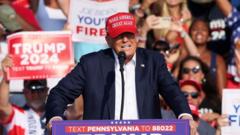**Amid rising tensions between right-wing Afrikaner groups and the South African government, Ramaphosa stands firm in defending democracy and unity.**
**Ramaphosa and Trump Clash Over Race Relations in South Africa**

**Ramaphosa and Trump Clash Over Race Relations in South Africa**
**President Cyril Ramaphosa addresses Trump's controversial claims about safety and race in South Africa during an Oval Office meeting.**
Cyril Ramaphosa faced intense scrutiny from former President Donald Trump in the Oval Office as the two discussed the sensitive issues of race and crime in South Africa. Trump's remarks about "white genocide" sent shockwaves through South Africa, prompting various reactions from both political leaders and citizens alike.
The Solidarity Movement, a right-wing Afrikaner group, celebrated Trump's unexpected confrontation, with its members expressing gratitude for bringing South Africa's challenges into the global spotlight. Prominent figure Ernst Roets praised the former president's actions, indicating this was a landmark moment in the acknowledgment of white persecution, while others called for Trump to receive a Nobel Prize for shedding light on the crisis of farm murders.
Political analysts noted that Trump's aggressive approach highlighted how misinformation has fueled support among the American right-wing for exaggerated narratives about South Africa. Despite this, Ramaphosa maintained composure during the discussion, raising valid points about the country's democratic principles. South Africa's multi-party government, which includes representation across racial lines, aims to address pressing societal issues such as crime and unemployment.
In attendance was John Steenhuisen, the Democratic Alliance's leader, who emphasized the need for collaboration and international support to effectively combat crime, countering the narrative that most white farmers are leaving South Africa. He firmly rejected the notion that white farmers were predominantly fleeing violence, showcasing commitment to improving conditions for all South Africans.
Trump's references to the Economic Freedom Fighters (EFF) party stoked further tensions, particularly with its leader, Julius Malema, known for singing the controversial "Shoot the Boer" during rallies. This song's historical context has been debated extensively, yet many see it as a political statement rather than an incitement to violence. The South African Supreme Court reinforced this by clarifying that such expressions are part of the country's political fabric.
In response to the Oval Office encounter, Ramaphosa emphasized the importance of uniting as a nation, evoking the legacy of Nelson Mandela in striving for reconciliation. While some Afrikaners wrestle with the idea of leaving South Africa due to perceived threats, Ramaphosa denounced claims of genocide, reiterating that crime transcends racial lines and impacts South Africans of all backgrounds.
Trade union leader Zingiswa Losi illustrated the dire reality faced by marginalized communities, advocating for a crime-focused dialogue rather than racial divisions. As tensions wane, the hope remains that the global community will engage with South Africa to foster healing and build a more equitable society.
The ideological divide remains stark, but Ramaphosa's commitment to unity and adherence to democratic values offers a pathway forward amidst the overshadowing climate of fear and misunderstanding.
The Solidarity Movement, a right-wing Afrikaner group, celebrated Trump's unexpected confrontation, with its members expressing gratitude for bringing South Africa's challenges into the global spotlight. Prominent figure Ernst Roets praised the former president's actions, indicating this was a landmark moment in the acknowledgment of white persecution, while others called for Trump to receive a Nobel Prize for shedding light on the crisis of farm murders.
Political analysts noted that Trump's aggressive approach highlighted how misinformation has fueled support among the American right-wing for exaggerated narratives about South Africa. Despite this, Ramaphosa maintained composure during the discussion, raising valid points about the country's democratic principles. South Africa's multi-party government, which includes representation across racial lines, aims to address pressing societal issues such as crime and unemployment.
In attendance was John Steenhuisen, the Democratic Alliance's leader, who emphasized the need for collaboration and international support to effectively combat crime, countering the narrative that most white farmers are leaving South Africa. He firmly rejected the notion that white farmers were predominantly fleeing violence, showcasing commitment to improving conditions for all South Africans.
Trump's references to the Economic Freedom Fighters (EFF) party stoked further tensions, particularly with its leader, Julius Malema, known for singing the controversial "Shoot the Boer" during rallies. This song's historical context has been debated extensively, yet many see it as a political statement rather than an incitement to violence. The South African Supreme Court reinforced this by clarifying that such expressions are part of the country's political fabric.
In response to the Oval Office encounter, Ramaphosa emphasized the importance of uniting as a nation, evoking the legacy of Nelson Mandela in striving for reconciliation. While some Afrikaners wrestle with the idea of leaving South Africa due to perceived threats, Ramaphosa denounced claims of genocide, reiterating that crime transcends racial lines and impacts South Africans of all backgrounds.
Trade union leader Zingiswa Losi illustrated the dire reality faced by marginalized communities, advocating for a crime-focused dialogue rather than racial divisions. As tensions wane, the hope remains that the global community will engage with South Africa to foster healing and build a more equitable society.
The ideological divide remains stark, but Ramaphosa's commitment to unity and adherence to democratic values offers a pathway forward amidst the overshadowing climate of fear and misunderstanding.


















